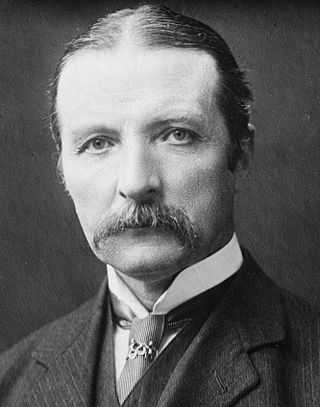
William Archer was a Scottish author, theatre critic, and English spelling reformer based, for most of his career, in London. He was an early advocate of the plays of Henrik Ibsen, and a friend and advocate of George Bernard Shaw.
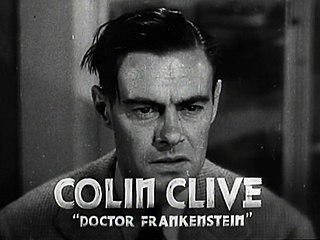
Colin Glenn Clive was a British theatre and film actor. He is most famous for his role as Dr. Henry Frankenstein in the 1931 film Frankenstein and its 1935 sequel, Bride of Frankenstein.

Una O'Connor was an Irish-born American actress who worked extensively in theatre before becoming a character actress in film and in television. She often portrayed comical wives, housekeepers and servants. In 2020, she was listed at number 19 on The Irish Times list of Ireland's greatest film actors.
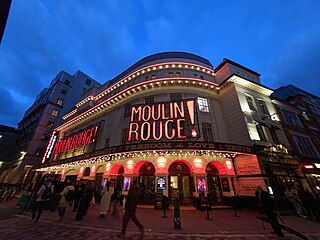
The Piccadilly Theatre is a West End theatre located at the junction of Denman Street and Sherwood Street, near Piccadilly Circus, in the City of Westminster, London. It opened in 1928.

The Saville Theatre building is a former West End theatre and cinema at 135 Shaftesbury Avenue in the London Borough of Camden. The theatre opened in 1931, and became a music venue during the 1960s. In 1970, it became a cinema, most recently as the Odeon Covent Garden.

Edward Knoblock was a playwright and novelist, originally American and later a naturalised British citizen. He wrote numerous plays, often at the rate of two or three a year, of which the most successful were Kismet (1911) and Milestones. Many of his plays were collaborations, with, among others, Vicki Baum, Beverley Nichols, J. B. Priestley and Vita Sackville-West.
The Westminster Theatre was a theatre in London, on Palace Street in Westminster.

John Peter Wearing is an Anglo-American theatre historian and professor, who has written numerous books and articles about nineteenth and twentieth-century drama and theatre, including The Shakespeare Diaries: A Fictional Autobiography, published in 2007. He has also written and edited well-received books on George Bernard Shaw, Arthur Wing Pinero, extensive reference series on the London theatre from 1890 to 1980, and theatrical biographies, among other subjects. As a professor of English literature, Wearing has specialised in Shakespeare and modern drama.
Samuel George Herbert Mason was a British film director, producer, stage actor, army officer, presenter of some revues, stage manager, stage director, choreographer, production manager and playwright. He was a recipient of the Military Cross the prestigious award for "gallantry during active operations against the enemy." He received the gallantry award for his part in the Battle of Guillemont where British troops defeated the Germans to take the German stronghold of Guillemont.
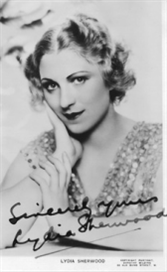
Lydia Sherwood was a British film actress and stage actress. She made her debut on stage in Daisy Fisher's comedy play Lavender Ladies. She was married to the poet Lazarus Aaronson from 1924 to 1931.
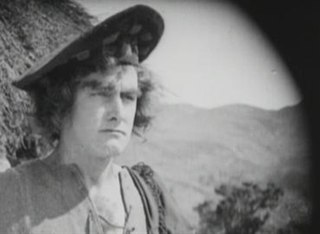
David Hawthorne was a British stage and film actor. He played the leading man in a number of films during the silent era, but later switched to character roles. One of his more notable roles was that of Rob Roy MacGregor in the 1922 film Rob Roy.

Horace Mills was a British singer, actor and dramatist who specialised in playing pantomime dames in the early 20th-century.

Winifred "Betty" Barnes was an English actress and singer known for roles in Edwardian musical comedy and operetta, creating the title role in Betty, among others. After 15 years on the stage, she retired upon her marriage in 1924.
Double Dan is a 1927 comedy crime play by the British writer Edgar Wallace. It is inspired by the 1924 novel Double Dan by Wallace. The plot concerns high finance and a criminal who is a master of disguise.
Double Dan is a 1924 crime novel by the British writer Edgar Wallace. It was published in the United States as Diana of Kara Kara.
The Outsider is a play by the British writer Dorothy Brandon. It portrays the struggle of an unorthodox medical practitioner to gain acceptance by the medical establishment. It was subsequently revised to show the unconventional triumphing over the conventional, whereas the play had originally had the opposite ending.
Falling Leaves is a 1924 play by the British writer Sutton Vane. It features a love triangle between three characters.
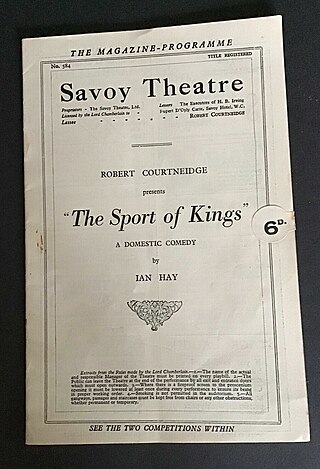
The Sport of Kings is a 1924 comedy play by the British writer Ian Hay. It ran for 319 performance at the Savoy Theatre in the West End between 8 September 1924 and 13 June 1925.
The Great Adventure is a play by Arnold Bennett. It was first produced in London in March 1913 and ran for 674 performances. A Broadway production later in 1926 ran for 52 performances. The play depicts the complications that ensue when a famous artist adopts the persona of his dead valet to escape his unwelcome celebrity.

Our Nell is a musical with a book by Louis N. Parker and Reginald Arkell and music by Harold Fraser-Simson and Ivor Novello. It is based on the life of the English actress Nell Gwynn, mistress of Charles II. It was inspired by an earlier musical Our Peg by Edward Knoblock, that premiered in 1919 based on the life of the eighteenth century actress Peg Woffington.













